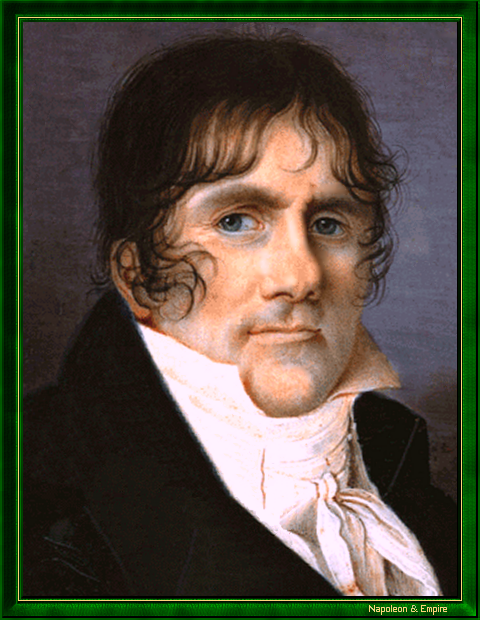Pronunciation:

Paul François de Barras-Clumanc was born on June 30, 1755 in Fox-Amphoux in Provence, into a noble family. At sixteen, he joined the army and served in the colonies and India.
In 1780, Barras was on board the ship La Sartine which ran aground at the entrance to the port of Marseille on its return from Bourbon Island. The famous Marseille story of the sardine blocking the entrance to the port was born from this incident.
He then moved to Paris where he quickly dissipated his fortune. He returned to his native Provence after the storming of the Bastille, which he witnessed by chance. The prestige of his name allowed him to be elected deputy to the Convention. There, he remained in the background but nevertheless votes for the death of the king. Sent on a mission to the army of Italy, he took part in the siege of Toulon where he showed himself to be both determined and courageous. It was then that he met Napoleon Bonaparte, whose rise he would subsequently promote.
On his return to Paris in 1794, Barras had to face suspicions of prevarication. Feeling threatened by Robespierre, he took a major part in the latter's fall on 9 Thermidor. He then became one of the leaders of the Thermidorian party.
On 13 Vendémiaire Year IV (October 5, 1795), he crushed the insurrection of the royalist sections with the collaboration of Napoleon Bonaparte, whom he has chosen as his deputy.
Shortly after, he became one of the five Directors endowed with executive power by the new constitution. In this position, he dominated his colleges and in fact managed the Executive Directory. It was he who organized the successive coups required for the survival of the republican regime.
His influence on the destiny of young Bonaparte was decisive. After marrying him to his mistress, Marie-Josèphe-Rose de Tascher de La Pagerie, widow of General Alexandre François Marie de Beauharnais, Barras entrusted his protégé with command of the Army of Italy. The Director also seemed to be doing his best to put in place the framework of the regime which will overthrow the Executive Directory since it is also he who appointed Joseph Fouché and Charles Maurice de Talleyrand-Périgord as ministers.
Bonaparte's ambitions having increased tenfold by the Italian campaign, Barras pushed him into the Egyptian campaign in order to keep him away from political life. But on the general's return, although informed of the preparations for 18 Brumaire, Barras let it happen and effaced oneself with apparent good grace before the First Consul. However, from that day on, he devoted a hatred to him that would not be denied.
Barras then retired to his castle at Grosbois, after refusing the United States embassy and the command in Saint-Domingue that Bonaparte offered him in order to keep him away. Later, when Napoleon forbade him to approach Paris within forty leagues, he settled in Brussels.
In 1805, he obtained authorization to reside in Provence and lived for some time in Aygalades, in the suburbs of Marseille. New intrigues in favor of the Bourbons soon earned him a new exile, this time in Rome (1810).
He returned to France after the fall of the Empire, settled in Chaillot in the former convent of Sainte-Périne, and resumed his sumptuous existence.
Barras died there on January 29, 1829. His grave is located in Pere Lachaise cemetery, Paris (28th division).
"Paul-François, viscount of Barras". Nineteenth century French school.

Even if his morals, his honesty and his abilities as a statesman have been violently attacked, by some of his contemporaries as well as by many historians, it is undeniable that he was one of the most important revolutionaries, by precipitating the fall of Robespierre, then by taking a leading part in the government of France during the Executive Directory. He was also favored in this by luck, fate having always spared him when it came to designating, once a year, the Director to be replaced.
Barras, who is widely criticized for his dissolute morals, was in fact the lover of some of the most beautiful women of his time, notably Joséphine de Beauharnais and Thérésa Cabarrus (Madame Tallien, princess of Caraman-Chimay). Some testimonies suggest that his mistresses were more attracted by his presence, his generosity and the ease of his character than by his vigor.
Barras, although regicide, will never be troubled by Bourbon justice.
Other portraits

Enlarge
"Paul-François, viscount of Barras". Lithography by François-Séraphin Delpech (1778-1825).